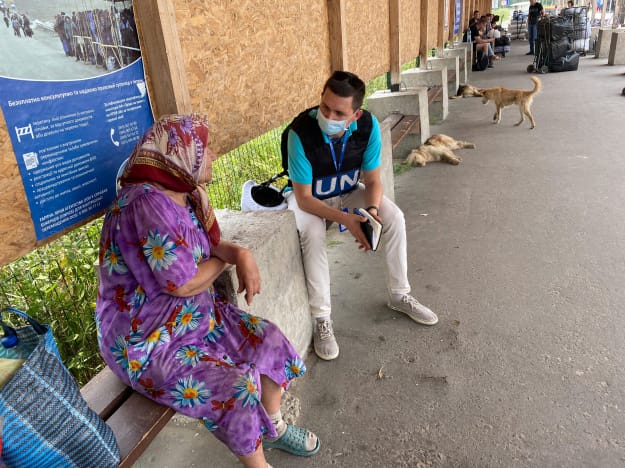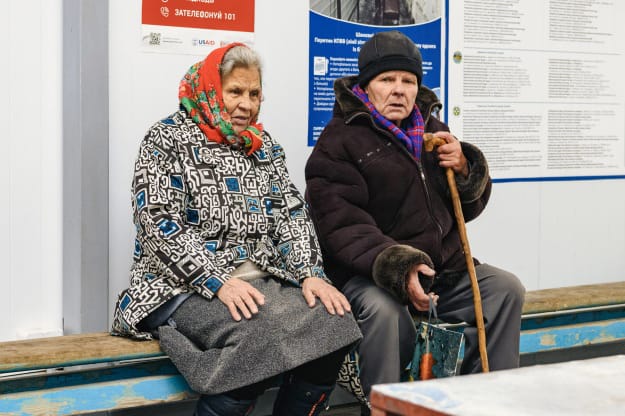Ukrainian Pension System at the Crossroads
This is a joint joint opinion piece by the International Labor Organization in Ukraine and the UN Human Rights Monitoring Mission in Ukraine
Authors:
Sergiy Savchuk, National Coordinator of the International Labor Organization in Ukraine
Advertisement:Matilda Bogner, Head of the UN Human Rights Monitoring Mission in Ukraine
We are in unprecedented times. Coronavirus, market upheaval, economic slowdown – all igniting the feeling of insecurity.
All humans strive to have at least an adequate standard of living and Governments need to support their populations to fulfill this right. Thus, it is critical to have a robust social protection system in place for all Ukrainians and a pension system that provides adequate levels of income in line with international labour and human rights standards.
Ukraine is in the top 15 countries globally for the fastest ageing population and the State Budget has allocated about UAH 170 billion to cover pensions in the security and defence sectors, fund social contributions for some categories of people, allowances, increases to pensions and to bridge the deficit of the Pension Fund.
The Ukrainian pension system stands at a crossroads and the recent COVID-19 crisis has only amplified the urgent need for reform.
The UN in Ukraine is committed to sustainable development in Ukraine, including a pension system that will support an adequate standard of living.
It has contributed to the government’s reform agenda by developing a Policy Paper on Social Protection, as well as through the provision of expert, in-depth analysis and policy advice and recommendations.
In this context and with ongoing debate surrounding pension reform, will the State find the resources required to support an adequate standard of living for pensioners?
Retirement has become the start of a race for survival for many Ukrainians, as pension benefits are low and mechanisms for adjustment to the cost of living are inadequate.
Moreover, those who join the workforce do not see a benefit from participating in the pension system beyond the minimal requirement. Also, many people are avoiding social security contributions altogether.
Simply put, these facts indicate that the social contract is weakened, if not broken and that there is a need for a call to action to maintain a decent standard of living in old age.
The Government of Ukraine sees the solution in a privately managed pension system which could be implemented by the end of 2021. The Government is planning to introduce a second pension pillar based on individual accounts, which follows the restructuring of the pension system initiated in 2017.
While the Government sees the proposed system as the only way for future pensioners to receive a decent pension, and for businesses to maintain an adequate workforce, the International Labour Organization (ILO) has expressed cautionary remarks concerning the planned privatization of pensions.
The difference is that in the private system, the consequences of these problems will fully fall on the contributors (workers and their employers), while the State pension system incorporates a certain redistributive mechanism that mitigates harsh impacts on individuals.
The introduction of the second pension pillar should be preceded by addressing the current problems of low coverage and low compliance. In particular, priority should be placed on taking concerted action along with partners to improve social security law enforcement, increase compliance in contribution collection, and reduce informality and undeclared work. Any additional resources should be redirected to the public pension system to reduce the deficit and to improve the adequacy of benefits.
Outlined below are some of the key areas of pension reform that the UN in Ukraine believes should be prioritized.
Pension system coverage should be extended
Currently only 36% of the population aged 15–64 in Ukraine is contributing to the State pension system. There is a growing diversification in working arrangements and a growing number of workers in "non-standard forms of employment", including temporary, part-time, dependent self-employment and in the "platform economy" [According to an ILO study of 2018 "Work on Digital Labour Platforms in Ukraine: Issues and Policy Perspectives", Ukraine is placed first in Europe, and fourth in the world, in terms of work on digital labour platforms. Three quarters of online workers are not registered, nor are they covered by social security systems.].
Therefore, there is an urgent need for Ukraine to take measures to increase labour force participation and the rates of formal employment, effective coverage of all types of employment contracts, enforcement and compliance with reporting economic activities and paying contributions. I
n this respect, it is important to support youth with the transition from education to work, facilitate men and women sharing the responsibilities of work and family obligations, and create a labour market environment where older persons are willing and able to continue employment.
Pension payments should be de-linked from registration as an internally displaced person (IDP)
People residing in eastern Ukraine face hurdles in accessing pensions that they have contributed to throughout their working life. Some cannot prove their work history because the enterprises they worked for are currently located in non-Government controlled areas (NGCAs). Many people live in acute poverty but are not getting the pensions that they are legally entitled to.


The existing legal framework requires that IDPs register to receive pensions, which is inconsistent with international human rights law (particularly, the articles 2 and 9 of International Covenant on Economic, Social and Cultural Rights).
People registered in NGCA are eligible for their pensions only if they have the IDP certificate and stay in Government-controlled areas (GCA). To remain registered as IDPs and receive the pension, NGCA pensioners must not leave GCA for more than 60 consecutive days, otherwise their IDP certificate and consequently pension, would be suspended.
Therefore, pensioners in NGCA face the constant risk of having their payments suspended if they do not cross into GCA every 60 days. The temporary suspension of pensioners and IDPs verifications due to COVID-19 is a welcome measure, but it does not solve the systemic problem.
The Office of the High Commissioner for Human Rights and other international and national organizations have long been advocating that pension payments should be delinked from IDP registration through the enactment of legislative and regulatory amendments.
Whilst the UN welcomes the fact that a draft law has been developed to address these administrative bottlenecks, we urge that it be re-submitted to the Verkhovna Rada for adoption as soon as possible.
Wider analysis and dialogue are needed to discuss the future of the pension system
Ukraine urgently needs pension reform to ensure decent pensions to all individuals who have worked throughout their lives.
To move forward and create the perspectives for an adequate and sustainable pension system, it is imperative for all key stakeholders – the Government, trade unions and employers – to maintain this issue as a top priority.
The decision regarding which forms of supplementary pensions should be developed (for instance, mandatory or voluntary, privately or centrally managed, covering all workers or certain occupational groups) should be decided through an inclusive national dialogue.
The UN stands ready to provide continuous technical assistance for a well-designed, reformed pension system, which is urgently needed to alleviate poverty of aging Ukrainians and to build the foundation for future prosperity.






